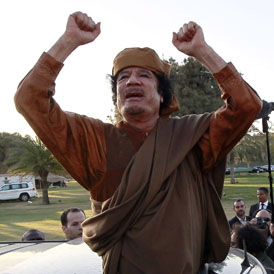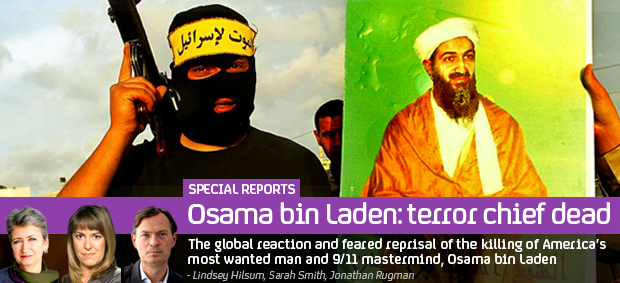Libya: Will Gaddafi use mustard gas?
Following Osama bin Laden’s death, defence analyst Anthony Tucker-Jones says there are rising concerns over the fate of Libya’s chemical weapons.

After the killing of Osama bin Laden there are increasing fears that a cornered Colonel Gaddafi will lash out with his remaining chemical weapons as Saddam Hussein once did against the Iranians and Kurds.
Just days before the death of the world’s most wanted terrorist, General Abdul Younis, the Libyan rebels’ chief of staff was warning Nato of the danger. The former Libyan Justice Minister Mustafa Abdel Galil issued a similar warning at the end of February.
In addition, the beleaguered defenders of Misrata have been calling for gas masks following rumours that local Gaddafi forces have been issued with them.
The UK’s Porton Down, formerly the UK Chemical and Biological Defence Establishment (under the aegis of DSTL – Defence Science and Technology Laboratory), is now on standby in case Gaddafi resorts to such drastic measures.
DSTL’s Counter-Terrorism Centre has been advising the SAS and the Joint Chemical, Biological, Radiological and Nuclear Regiment (JT CBRN Regt) on possible locations and options. The latter is a unique and highly specialised British WMD unit.
Read our Special reports Libya War: Strike against Gaddafi
Likewise DSTL’s chemical weapons EOD experts are on alert should they be needed in-country.
A DSTL source said, “We would certainly like to get our hands on Libya’s mustard gas, as this would be an important intelligence windfall.”
As part of Libya’s rapprochement with the West, Gaddafi formally took responsibility for the 1988 Lockerbie bombing in 2003 and subsequently renounced his WMD programme.
Reportedly Gaddafi had 100 tons of mustard gas, had been seeking to enrich uranium and develop biological weapons. The destruction of his chemical weapons was being overseen by the Organisation for the Prohibition of Chemical Weapons; unfortunately the process was never finished – though his delivery systems, long range missiles and mortar bombs were destroyed.
“We should not be complacent about the threat and we are planning for every contingency.” Porton Down source
Mustard gas is a particularly unpleasant blistering agent that attacks the eyes, respiratory tract and moist parts of the body. When delivered by bomb, rocket or shell the vapour is always indiscriminate and affected by the prevailing winds. Used in Libya it would cause horrific civilian casualties and result in an international outcry.
According to the DSTL source: “It is estimated that he has about 10 tons of mustard gas precursors remaining from stocks already destroyed.” These are believed to be stored at the Rabta Chemical Weapons Production Facility – one of the largest of its kind in the Developing World.
“The condition of his CW stocks is hard to gauge, as is his ability to weaponise it,” the source added. “But we should not be complacent about the threat and we are planning for every contingency.”
Increased security
US intelligence reported security has been stepped up around the remaining agents required for chemical weapons. This will have been done for three reasons: to protect them from the rebels, to protect them against Coalition air strikes or ready for deployment.
If Gaddafi went down this road it would be short-lived in the face of retaliatory Coalition air strikes. If called to assist with any detection or clear up work, the British Army has its dedicated JT CBRN Regt (based at RAF Honington, Suffolk – elements have seen service in Afghanistan, Irag and Kuwait). This unit deploys the state of the art Fuchs NBC reconn vehicles which came into service during the first Gulf War.
Likewise Porton Down could assist making any located stocks safe through their advice or specialist teams. Porton Down has considerable experience in handling mustard gas, having been involved with the UN’s Chemical Destruction Group in Iraq during the 1990s.
An incinerator was built at Muthana to handle Saddam Hussein’s mustard gas, destroying a total of 34,000 munitions (which included 122mm rockets and 155mm shells filled with mustard gas).
By then, the damage had already been done. Saddam used 100,000 “special” munitions during the Iran-Iraq War – Iran lost 44,000 troops to chemical attacks and 100,000 soldiers and civilians were exposed. Some 20,000 Iraqi Kurds were subsequently killed or injured at Halabja.
After the death of bin Laden, Gaddafi will now be convinced he is being targeted by US Special Forces – under such circumstances who knows what he will do?
His armoury still includes Soviet-supplied Scud missiles and artillery shells that could be converted to take mustard gas or other agents. He may be asking himself: What price political power?
One can only hope the voice of reason prevails within Gaddafi’s inner circle.
Anthony Tucker-Jones is author of ‘The Rise of Militant Islam’ and a correspondent for Intersec – The Journal of International Security and defencemanagement.com
